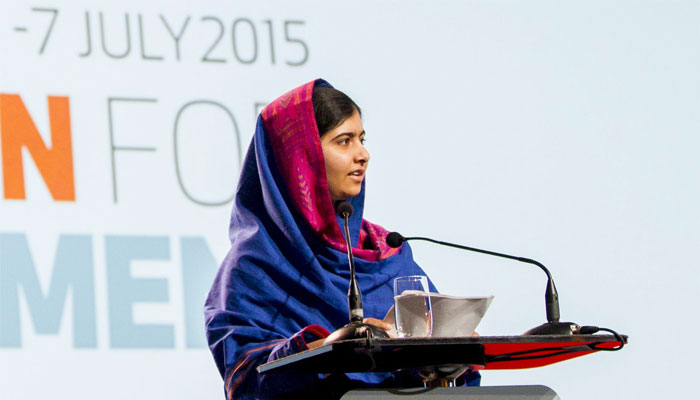Nobel Peace Prize winner Malala Yousafzai speaks during the Oslo Summit
on Education for Development at Oslo Plaza in Oslo, Norway. REUTERS
Reuters/Oslo
Pakistan's Malala Yousafzai, the youngest winner of the Nobel Peace Prize, urged an extra $39 billion a year for education worldwide on Tuesday and said she wants to remain the "voice of children" even after she turns 18 next week.
The cash, to allow all children to attend secondary schools, was the equivalent of cutting global military spending for eight days, she told Reuters at an international education conference in Oslo.
"The world needs to think bigger and it needs to dream bigger," she said, saying UN goals for 2015 wrongly only focused on universal primary schooling. Fifty-nine million children, many in war zones, do not even attend primary school.
Best known by her first name, Malala became a global symbol of defiance after she was shot on a school bus in 2012 by the Taliban for advocating girls' rights.
The extra $39 billion a year is the estimated cost of extending basic education to 12 years from nine.
"If nine years of education is not enough for your children, it is not enough for the rest of the world's children," she told several hundred delegates including United Nations Secretary-General Ban Ki-moon.
Malala, who started her speech by saying "I am here as the voice of children", also noted she becomes an adult on July 12. "My life of being a child will come to an end, it's quite hard," she said.
But she said her approach will be unaffected.
"I think there's no limit of age ... to speak of all children's rights. My father has been doing it as a teacher and I will continue to do it as a woman," she said. "As an adult, you can be the voice of children."
Malala, who now lives in England, was a joint winner of the 2014 Nobel Peace Prize. Ban praised her in a speech, saying she "embodied the courage of girls resolved to claim their rights."
Also at Tuesday's conference, Norwegian Prime Minister Erna Solberg won U.N. backing for a commission to look into new ways to raise funds for education. It would make recommendations by September 2016.
The commission, also backed by the leaders of Indonesia, Malawi, Chile and the UN children's fund UNICEF, will be chaired by former British prime minister Gordon Brown.
Malala, who has two more years at school, said she hoped to return to Pakistan after university. "I am more interested in history, economics, these kind of subjects, so I might go to Oxford," she said.
But she added, jokingly: "I have got so many honorary degrees - from Edinburgh and many others."

